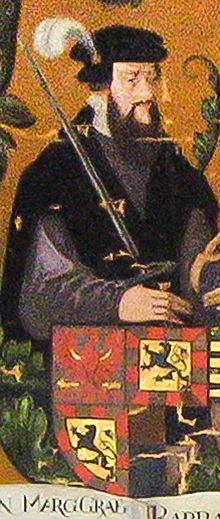Johann (Brandenburg-Kulmbach)
Johann von Brandenburg , called the Alchemist , (* 1406 ; † November 16, 1464 in Baiersdorf ) was margrave of the Hohenzollern Margraviate of Brandenburg-Kulmbach .
Life
Johann the Alchemist was the eldest son of the future Elector Friedrich I of Brandenburg (1371–1440) from his marriage to Elisabeth (1383–1442), daughter of Duke Friedrich von Bayern-Landshut . At the time of his birth, his father was still burgrave of Nuremberg . Johann's younger brothers were Friedrich II. And Albrecht Achilles , Electors of Brandenburg.
In 1416 Johann married Barbara (1405–1465), daughter of Duke Rudolf III. of Saxony-Wittenberg . The marriage was brokered by Emperor Sigismund , who had promised to enfeoff Johann with Electorate Saxons as the successor of the Ascanians . Johann was compensated with a sum of money in 1422. At the age of 20 he was included in the affairs of government by his father and two years later he was appointed governor of the mark . Here Johann , who was not very ambitious and attached to alchemy, became a disappointment for his father, who, with his consent, rearranged the succession in 1437 and allocated the area to Johann, ruled jointly by Friedrich and Johann until 1403. In 1440 Friedrich II became the elector of Brandenburg. However, his brother Johann was not interested in government business.
Johann renounced his rights of the firstborn and received the Franconian possessions of the Hohenzollern. His residence was the Plassenburg in Kulmbach . In 1457 he resigned from the government. Since he had no surviving male descendants, one of his younger brothers, the Margrave of Ansbach Albrecht Achilles , with whom he had traveled to Jerusalem in 1435 , took over the Principality of Kulmbach in personal union.
In the Peace of Wittstock in 1442, Johann ended a dispute between the Mark Brandenburg and Mecklenburg over succession and feudal rights after the Werle line died out after the death of Wilhelm von Werle in 1436. He secured Brandenburg the Uckermark ( Lychen etc.), which from then on finally stayed with Brandenburg, and established the right of the Brandenburgers to contingent succession in Mecklenburg in the event of the Mecklenburg Princely House becoming extinct in the male line capable of succeeding the throne.
His son-in-law, King Christoph of Denmark from the House of Wittelsbach , entrusted him with the administration of his possessions in the Upper Palatinate .
progeny
From his marriage, Johann had the following children:
-
Barbara (1422-1481)
- ⚭ 1433 Margrave Luigi III. Gonzaga of Mantua (1414–1478)
- Rudolf (* / † 1424)
-
Elisabeth (1425–1465)
- ⚭ 1. 1440 Duke Joachim of Pomerania (1427–1451)
- ⚭ 2. 1454 Duke Wartislaw X. of Pomerania (1435–1478)
-
Dorothea (1430-1495)
- ⚭ 1. 1445 King Christoph III. of Denmark, Norway and Sweden (1416–1448)
- ⚭ 2. 1449 King Christian I of Denmark (1426–1481)
In addition, the illegitimate son was Fritz von Brandenburg. He had two daughters: Magdalena and Franziska von Brandenburg. They were married to Italian counts.
See also
literature
- Theodor Hirsch: Johann the Alchemist . In: Allgemeine Deutsche Biographie (ADB). Volume 14, Duncker & Humblot, Leipzig 1881, p. 153.
- Johannes Schultze: Johann (the alchemist). In: New German Biography (NDB). Volume 10, Duncker & Humblot, Berlin 1974, ISBN 3-428-00191-5 , p. 472 f. ( Digitized version ).
- R. Seyboth: Margrave Johann the Alchemist of Brandenburg (1406–1464). Studies on his personality and his politics , in: Yearbook for Franconian State Research 51 (1991), pp. 39-69.
- M. Spindler, A. Kraus: History of Franconia up to the end of the 18th century , Munich 1997. ISBN 3-406-39451-5
Individual evidence
- ^ Max Döllner : History of the development of the city of Neustadt an der Aisch until 1933. Ph. CW Schmidt, Neustadt ad Aisch 1950; New edition 1978 on the occasion of the 150th anniversary of the Ph. CW Schmidt Neustadt an der Aisch 1828-1978 publishing house. P. 32.
- ↑ Karl Müssel: Bayreuth in eight centuries . Gondrom, Bindlach 1993, ISBN 3-8112-0809-8 , p. 47 .
| predecessor | Office | successor |
|---|---|---|
| Friedrich I. |
Margrave of Brandenburg-Kulmbach 1437–1464 |
Albrecht Achilles |
| personal data | |
|---|---|
| SURNAME | Johann |
| ALTERNATIVE NAMES | Johann the Alchemist |
| BRIEF DESCRIPTION | Margrave of Brandenburg-Kulmbach |
| DATE OF BIRTH | 1406 |
| DATE OF DEATH | November 16, 1464 |
| Place of death | Baiersdorf |
